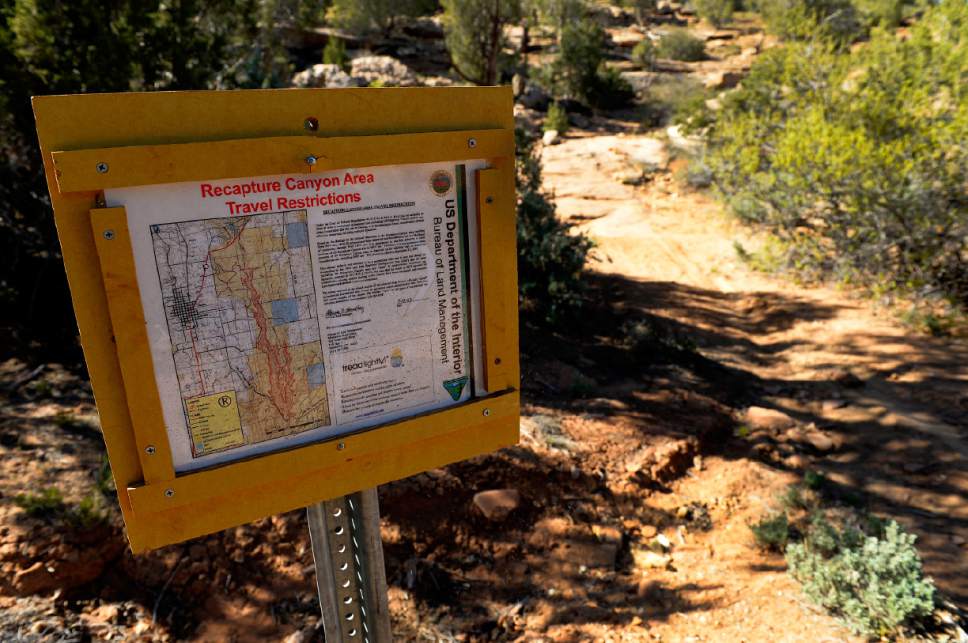This is an archived article that was published on sltrib.com in 2017, and information in the article may be outdated. It is provided only for personal research purposes and may not be reprinted.
Washington • President Donald Trump's proposed 2018 fiscal budget would hit Utah's needy and disabled, cut block grants to communities, slash funding for public lands and public transit projects and could hurt rural airport services.
The budget, which Congress is unlikely to take up but reveals White House spending priorities, seeks cuts in most departments' spending, some deeply, including decreases in social services and other government programs that would affect a broad swath of Americans.
Three departments, Defense, Homeland Security and Veterans Affairs, see a bump in Trump's budget.
Closer to home, Utah could see less money for rural development, Federal Emergency Management Agency grants, Amtrak service and a halt to money meant to seal off abandoned mines.
On a positive note, the budget includes a $51 million line item to remodel Ogden's IRS facility, which has not seen significant repair in its half century of use and currently has an "obsolete" and unreliable fire-alarm system.
The Interior Department, which manages a large swath of Utah's public lands, including 22.9 million Bureau of Land Management acres, would face an $11.7 billion cut, or about 11 percent of its total budget. Part of that would be a 23 percent hit to a fund that oversees conservation areas, including national monuments, a move that environmental groups say would harm protection of treasured landscapes.
Interior Secretary Ryan Zinke said Tuesday "there's enough money in this budget" to manage the millions of acres of public lands but added that the proposed spending plan focuses on the department's core missions.
"Rather than simply adding more land to [the government's holdings], we want to make sure we take care of what we have," Zinke said in a conference call with reporters.
Zinke, a former Montana congressman, said the budget blueprint would put the federal government on a path to a balanced budget in 10 years and while some cuts may be difficult to swallow, they are needed to focus on what the government should be doing.
"It was not an easy job, there were difficult decisions that were made," he said. "The budget overall speaks to the core mission of the Department of the Interior."
Under an executive order Trump signed in April, Zinke has until early June to report back any recommendations on changing or jettisoning the Bears Ears National Monument designation in southeastern Utah and until August to review some 24 other monuments, including the Grand Staircase-Escalante National Monument.
The Interior Department did not respond to a question of whether Trump's proposed budget cuts to national monuments assume there will be changes, saying that "no decisions on monuments have been made."
Environmental groups blasted the budget plan, arguing it would harm public lands, lead to more energy development and leave protected areas more vulnerable.
"This budget is a shameless attack on America's parks and public lands," said Jennifer Rokala, executive director of the Center for Western Priorities.
"From gutting one of America's most important parks programs to increasing spending on drilling and mining, it sure looks like this budget was written by oil, gas and coal companies."
The budget includes $90 million in funds for state grants from the Land and Water Conservation Fund, but otherwise slashes the fund by half, including a 75 percent cut to the land-acquisition program.
"This budget is the reality of the Republican vision for the country, and Republicans in Congress need to admit it," said Rep. Raul Grijalva of Arizona, the top Democrat on the House Natural Resources Committee. "It treats our environment as a speed bump on the way to greater oil profits and it eliminates any hope of sane climate protections."
The biggest targets in Trump's budget were foreign aid, environmental restrictions, scientific research and the arts, as well as social services. Under the spending plan the White House put out, the Supplemental Nutrition Assistance Program (commonly known as food stamps) would lose 29 percent of its money, the Children's Health Insurance Program would see a 19 percent drop, Medicaid 17 percent and the Temporary Assistance for Needy Families would take a 13 percent hit.
The Trump budget would zero out funding for several government programs that affect Utah, including:
• The Abandoned Mine Land Grants, which help communities close off mining sites.
• Community Services Block Grants, which cities and towns have used to improve or build facilities.
• TIGER grants that go toward transportation projects. The Utah Transit Authority, which in 2016 received a $20 million grant to build up TRAX and FrontRunner train service, expects the previously approved money to continue to come in and said it would work with the Department of Transportation and Utah's members of Congress to reinforce "the value that this TIGER grant will bring to the Wasatch Front."
• Essential Air Service, which subsidizes commercial airline service to regional airports like Moab.
The budget also proposes big cuts to Amtrak, which could hurt service outside the Northeast, and Superfund programs aimed at cleaning up shuttered industrial sites.
The budget also seeks cuts of $38 million from a program to clean up environment disasters, including the removal of uranium tailings along the Colorado River near Moab.



